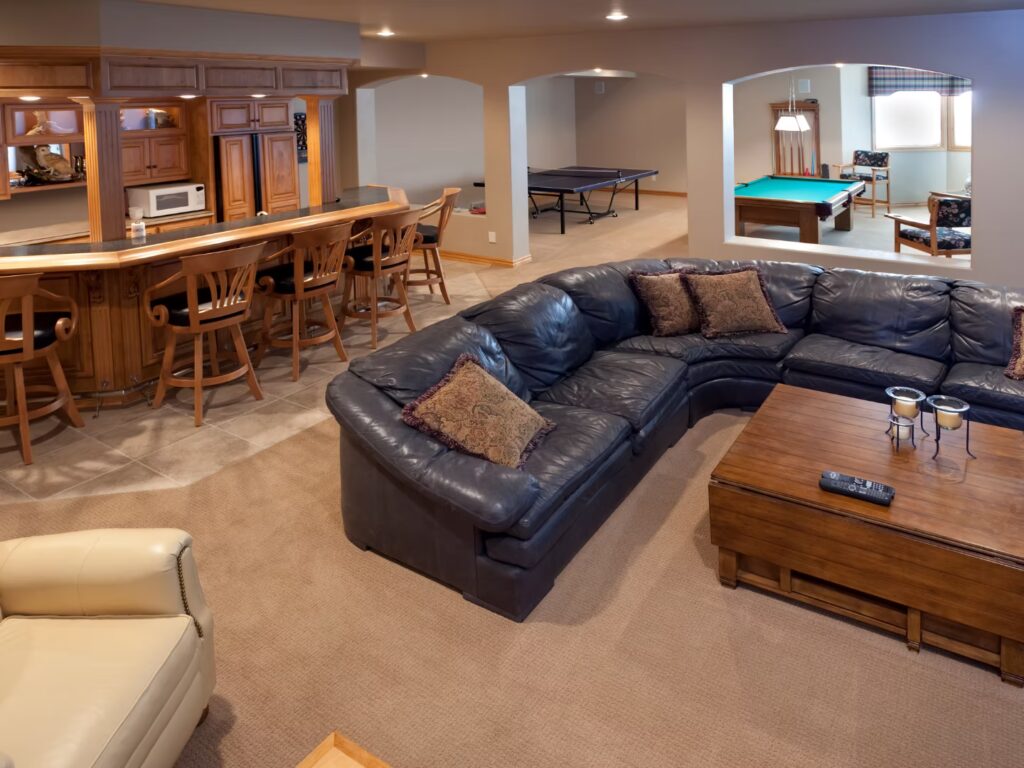A wet basement can be a nightmare for homeowners, causing water damage, mold growth, and compromising the structural integrity of your home.
Basement waterproofing is the best solution to insulate your home from these risks and help you protect your finished basement.
There are several types of basement waterproofing products, including interior and exterior, each with unique advantages and disadvantages.
In this blog post, we’ll explore the different types of basement waterproofing systems and help you decide which one is right for your home.

According to Angi, the average cost of water removal and remediation for a basement nationwide is around $3,833. However, this number does not factor in the full cost to replace any damaged items, including drywall or mold remediation, which counts as a separate service.
The same website also estimates the average cost of fully waterproofing a basement to be around $5,217 nationally. When added up, proactively addressing basement water issues will cost roughly the same as removing standing water, not factoring in the additional cost and safety risks of mold, structural damage, and damage to personal property.
Furthermore, fully waterproofing your basement may increase the value of your home in New Jersey, as data from Angi estimates that full waterproofing services can deliver a return on investment of 30%.
If you plan to finish your basement or want to protect your foundation from damage, interior and exterior drainage products can compound these benefits even further.
To gain the full scope of benefits that basement waterproofing can provide to homeowners in New Jersey, let’s explore the costs of services, what factors influence pricing, and how much waterproofing can increase the value of your home.
While the nationwide average cost of basement waterproofing is $5200, that number can be higher in certain parts of New Jersey, depending on geographic location, access to the basement, and local environmental conditions.
The more damage that already exists in your basement, the more intensive—and expensive—the waterproofing project may be.
Signs of advanced damage like structural cracks, standing water, or visible mold often require more extensive solutions, including interior drainage systems or even exterior excavation.
Larger basements require more materials, labor, and time to waterproof. Deeper basements may also require additional excavation or reinforcement, which can further increase the overall cost.
As a general rule, waterproofing is priced per linear foot or square foot, so size matters.
There are various waterproofing solutions available, ranging from basic sealants to advanced drainage systems. The type of solution you choose will affect the overall cost.
System Type | Estimated Cost (Range) |
Crack sealing & waterproof paint | $500 – $2,000 |
Interior drainage + sump pump | $2,500 – $10,000+ |
Exterior excavation & waterproofing | $8,000 – $20,000+ |
Vapor barrier installation | $1,000 – $4,000 |
French drain (interior or exterior) | $4,000 – $12,000 |
Note: These are estimated ranges and actual pricing will depend on your location, contractor, and home-specific needs.
If your basement is difficult to access—for example, due to landscaping, finished walls, or narrow entryways—it may cost more to perform the work. Limited access can slow down the installation process, require special equipment, or increase labor costs.
While DIY waterproofing may seem like a cost-effective option upfront, it may not provide long-term protection and could result in costly repairs down the line.
Professional waterproofing services offer expertise and tailored solutions, ensuring effective and lasting results.
Waterproofing your basement may seem like a large upfront cost, but the long-term benefits far outweigh the expense. Here’s why it’s a smart investment for any homeowner:
Water damage can lead to costly repairs, including foundation damage, mold remediation, and structural issues. Basement waterproofing helps prevent these issues, saving you money in the long run.
A dry, protected basement is a strong selling point for homebuyers and can boost the overall value of your property by 30% on average. Waterproofing is an added level of security in areas like New Jersey that experience heavy rainfall and snowmelt that future buyers will appreciate.
A damp basement can lead to mold and mildew growth, which can pose health risks to you and your family. Waterproofing creates a healthy living environment by preventing moisture buildup and improving indoor air quality.
When comparing the costs of water remediation and the long-term benefits of basement waterproofing, it’s clear that the latter offers a far better return on your investment.
If you live in a flood prone area or have experienced water in your basement previously, don’t wait to reach out for professional waterproofing services. All it takes is one storm to put your home and basement at risk for flooding and property damage.
At United Waterproofing, we understand the importance of a dry and healthy basement. Our team of experts specializes in providing customized waterproofing solutions to meet your specific needs and budget.
Contact us at 877-556-9494 or visit us online to schedule a consultation. Let us help you protect your basement and your home for years to come.
When installed professionally, most systems can last 20+ years. Frequent maintenance to check for clogs and other deficiencies can greatly extend the life of your system.
Typically, standard insurance policies do not cover water damage caused by seepage or poor maintenance. You may need to purchase additional flood insurance to cover groundwater issues.
Some surface-level fixes, like crack sealing and waterproof paint, can be done by homeowners. However, serious water intrusion or foundation issues should always be handled by professionals to ensure long-term protection.